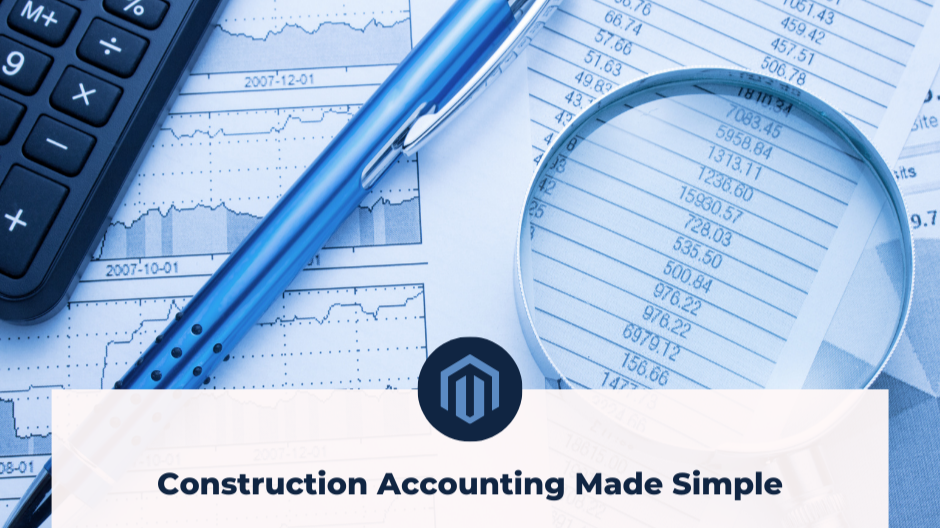
Bookkeeping plays a critical role in the success of any construction business. Managing finances effectively ensures profitability, helps track project costs, and keeps operations compliant with tax regulations. However, the complexity of construction accounting often leads to mistakes that can hurt your bottom line. Below, we discuss the most common bookkeeping errors in the construction industry and how to avoid them.
1. Failing to Track Job Costs Properly
Problem: Many contractors lump all expenses together instead of associating them with specific projects. This lack of tracking makes it difficult to identify which jobs are profitable and which are not.
Solution: Implement job costing practices that allocate labor, materials, and overhead expenses to individual projects. Bookkeeping software with job costing features can make this process much easier.
2. Not Separating Personal and Business Finances
Problem: Mixing personal and business expenses creates confusion, makes tax filing harder, and may lead to legal and compliance issues.
Solution: Open a separate business bank account and use dedicated credit cards for business purchases. This separation will provide a clear picture of your business’s financial health and streamline accounting processes.
3. Ignoring Retainage
Problem: Retainage—the percentage of payment withheld until a project is completed—is often overlooked or mismanaged, complicating revenue tracking.
Solution: Set up specific accounts in your bookkeeping system for retainage to track these funds separately from other revenues. This ensures clarity in your financial statements.
4. Improper Categorization of Expenses
Problem: Misclassifying expenses can lead to inaccurate financial reports and missed tax deductions.
Solution: Develop a clear chart of accounts tailored to the construction industry. Include specific categories like materials, subcontractors, equipment, and overhead to accurately track and report expenses.
5. Not Reconciling Accounts Regularly
Problem: Failure to reconcile accounts leads to discrepancies, missed errors, and incorrect financial records.
Solution: Reconcile your bank and credit card accounts monthly. This practice ensures accuracy and helps detect any unauthorized transactions or errors early.
6. Neglecting Change Orders
Problem: Not recording or updating books to reflect change orders results in underbilling or overbilling, impacting project profitability.
Solution: Update job costs and revenue projections immediately when a change order is issued. This ensures your financial records stay accurate and up-to-date.
7. Poor Cash Flow Management
Problem: Seasonal fluctuations and delayed payments from clients often cause cash flow issues.
Solution: Create cash flow forecasts to predict and prepare for fluctuations. Implement progress billing and deposit requirements to maintain liquidity during projects.
8. Failure to Track Labor Costs Accurately
Problem: Labor is one of the largest expenses in construction, but many companies fail to track it down to specific tasks or projects.
Solution: Use time-tracking tools integrated with your bookkeeping software to allocate labor costs accurately to each project. This provides better visibility into project profitability.
9. Noncompliance with Tax Regulations
Problem: Misunderstanding construction-specific tax rules, such as sales tax on materials or contractor licensing, can lead to penalties.
Solution: Work with a tax professional experienced in the construction industry. Stay updated on local and federal tax regulations to ensure compliance.
10. Overlooking Technology
Problem: Relying on manual bookkeeping methods increases the likelihood of errors and wastes valuable time.
Solution: Invest in bookkeeping software designed for construction businesses, such as QuickBooks Contractor Edition or Buildertrend. These tools streamline processes like invoicing, job costing, and payroll.
Tips for Avoiding These Mistakes
Hire a Professional: Employ a bookkeeper or accountant with expertise in construction accounting.
Train Your Staff: Ensure your team understands the basics of bookkeeping and the importance of accurate recordkeeping.
Conduct Regular Audits: Periodically review your financial records to identify and correct errors before they escalate.
Final Thoughts
Avoiding these common bookkeeping mistakes can save your construction business time, money, and stress. By implementing best practices, leveraging technology, and seeking professional help when needed, you can ensure your financial records are accurate and reliable.
Free Resource
Download our “Construction Bookkeeping Checklist” to keep your financial records in order and avoid costly mistakes
